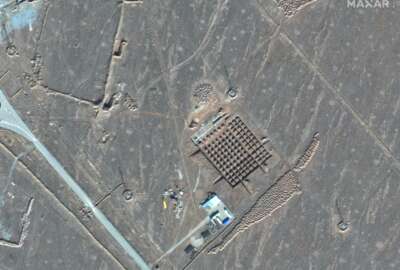

The NRO awarded five contracts to radar vendors, representing the first deals under a Broad Agency Announcement framework the agency is using to buy commercial...
The National Reconnaissance Office awarded five contracts to providers of commercial radar satellites, representing the first deals under a Broad Agency Announcement framework the agency is using to buy commercial space capabilities.
NRO awarded the contracts to Airbus, U.S.; Capella Space; ICEYE, U.S.; PredaSAR; and Umbra. The agency declined to release the value of the contracts.
They are the first deals awarded under NRO’s Strategic Commercial Enhancements BAA released last fall. The contracts have a six-month period of performance, with options to extend up to 30 months, according to Pete Muend, director of NRO’s Commercial Systems Program Office.
Initially, the work will be focused on “modeling and simulation data and a variety of specific [concept-of-operations] that we’re looking for,” Muend said on a call with reporters.
“As we progress to the later stages of the acquisition, that’s when we start getting on-orbit data to validate the modeling and simulation assertions, and also potentially have the wherewithal to purchase ad hoc imagery, data products and the like,” he continued.
NRO plans to assess each company’s radar capabilities and use the information as it develops new requirements, with the potential to lead to “operational contracts” and a program of record, according to Muend.
“This is really our first foray and initiative on the commercial radar side,” he said. “All five providers are new entrants into the process, as we start to better understand their capabilities, gain access to their products and start utilizing them as part of a larger community effort of course.”
The awards also include deals to two foreign-owned U.S. subsidiaries. Airbus is a European conglomerate, while ICEYE is a Finnish micro-satellite manufacturer.
The NRO is limiting a major procurement, the Electro-Optical Commercial Layer program, to U.S.-owned, U.S.-operated, and U.S.-controlled companies. That deal is currently in source selection.
But the BAA awards show NRO is “serious about ensuring that our customers have access to the most capable commercial remote sensing available,” Muend argued.
“We’ll reach across the global commercial remote sensing market to drive innovation and explore new phenomenologies,” he said.
Intelligence leaders have pledged to break down barriers to U.S. commercial space imagery firms, as well as those offering other kinds of geospatial intelligence. The NRO’s commercial BAA is central to the agency’s strategy to quickly pull in commercial capabilities and work with new firms.
“We have to innovate faster,” NRO Director Christopher Scolese said at the GEOINT 2021 Symposium in St. Louis. “We can’t rely on the standard contracting approach, which, while it goes reasonably fast, it still takes time. And ideas come quickly, and new technologies are being developed every day. But more importantly, new ways to employ technology are happening even faster.”
While radar capabilities is the first focus area, Scolese at the time said NRO would also look at hyper-spectral imaging, radio-frequency sensing and other emerging areas.
Muend declined to offer specifics the next solicitation under the BAA, but said NRO is still planning to look at additional capabilities.
“We’ll be looking at other phenomenologies over time, other initiatives,” Muend said. “And frankly, it’ll be an iterative process as well, where we’re always trying to keep up with the market, look at new providers and what they can bring to bear.”
Copyright © 2025 Federal News Network. All rights reserved. This website is not intended for users located within the European Economic Area.
Follow @jdoubledayWFED


